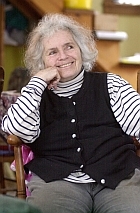 (Host) In almost any year, some of the moving moments come when we pause to reflect on those who have left the stage during the past few months.
(Host) In almost any year, some of the moving moments come when we pause to reflect on those who have left the stage during the past few months.
And, as VPR’s Steve Delaney reports, there were some notable departures this year.
(Delaney) When Jim Jeffords left the U-S Senate in January, he said he wanted to go home to his farm, and to spend more time with his wife Liz.
Four months later, Elizabeth Daley Jeffords lost her long fight with ovarian cancer. She had spoken frequently of her reaction to her cancer and its recurrences.
(Jeffords) “The first time was horrible. I railed, I ranted, I don’t think I talked, I snarled. I was angry at God, I was angry – especially when people would say oh, you know, God’s will be done. Well, God doesn’t have a thing to do with cancer. It’s a disease, at least that’s my opinion.”
(Delaney) Her friend, Taffy Maynard, says Liz Jeffords got past the anger, and handled her disease with grace.
(Maynard) “I would visit her and see her looking quite debilitated, and there would be a public function going on and I would think, `Oh she’s not going to be able to make it.’ And there she was with her wig on, looking like a movie star. She was incredible the way she just kept going, and her spirit was amazing.”
(Delaney) After his wife’s funeral, retired Senator Jim Jeffords moved to the Washington area to be close to his son’s family.
Again this year, there were memorial services for lives that had just gotten started.
In May, Essex social studies teacher Peter Gustafson mourned a former student, Marine Corporal Chris DiGiovine killed in Iraq by a roadside bomb.
(Gustafson “Very sad, he had a whole world ahead of him. With his degree in criminal justice he could have gone anywhere, FBI, the Border Patrol, could have done anything. It’s a loss to our community, to our state and our country that he’s gone.”
(Delaney) His family said DiGiovine had decided to make a career of the Marine Corps.
Adam Muller was a gunner in the Army, when his Humvee hit a roadside bomb early in November. Dana Storer lived in the same Vermont Technical College dorm as Muller, and saw a paper he’d written explaining his reasons for joining the Army.
(Storer) “He thought he could make a difference, and I think he thought what was going on in Iraq at the time was needed.”
(Delaney) For the most part, though, the remembrances were focused on those who had touched Vermont while creating their life’s work.
Federal Judge James Oakes of Brattleboro served on the Second Circuit Court of Appeals, and died in October. His opinion in the Pentagon Papers case influenced the subsequent Supreme Court decision.
Country doctor Brewster Martin died in August, in Chelsea, where he had begun his practice in the early ‘50s. He believed in civic involvement, and environmental conservation.
When Dr. Dan Wing joined the practice, he complained that patients weren’t following his directives. He recalls the old doctor lecturing him.
(Wing) “They don’t have to take your advice, they just have to pay you for it.”
(Delaney) Writer and activist Grace Paley, who moved to Vermont in 1988, became the state’s poet laureate four years ago. In a 50-year career, she produced three volumes of short stories and three collections of poetry. Grace Paley was 84.
Raul Hilberg, whose life’s work was studying the Holocaust, taught at UVM for more than three decades. His signature work, "The Destruction of the European Jews," became the foundation for the work done at the national Center for Advanced Holocaust studies in Washington. UVM faculty colleague Richard Sugarman said there was something undeniably serious about Hilberg’s demeanor.
(Sugarman) “He was a person in whose presence you could feel the force of history. ‘’
(Delaney) For 15 years, Efrain Guigui led the Vermont Symphony Orchestra, taking it to performances in every town in the state. Guigui was 81 when he died in Los Angeles in June.
And finally, Vermont Public Radio lost one of its founders this year. VPR was his passion and he had a vision. It took Ray Dilley two years of hard work before the station even went on the air, before he could utter the following words for the first time ever.
(Dilley) “You’re listening to public radio at 89.5 FM, WVPR in Windsor.”
(Delaney) Over the next 18 years Ray Dilley grew that little station into a multi-transmitter service that could reach almost every part of the state.
For Vermont Public Radio, I’m Steve Delaney.